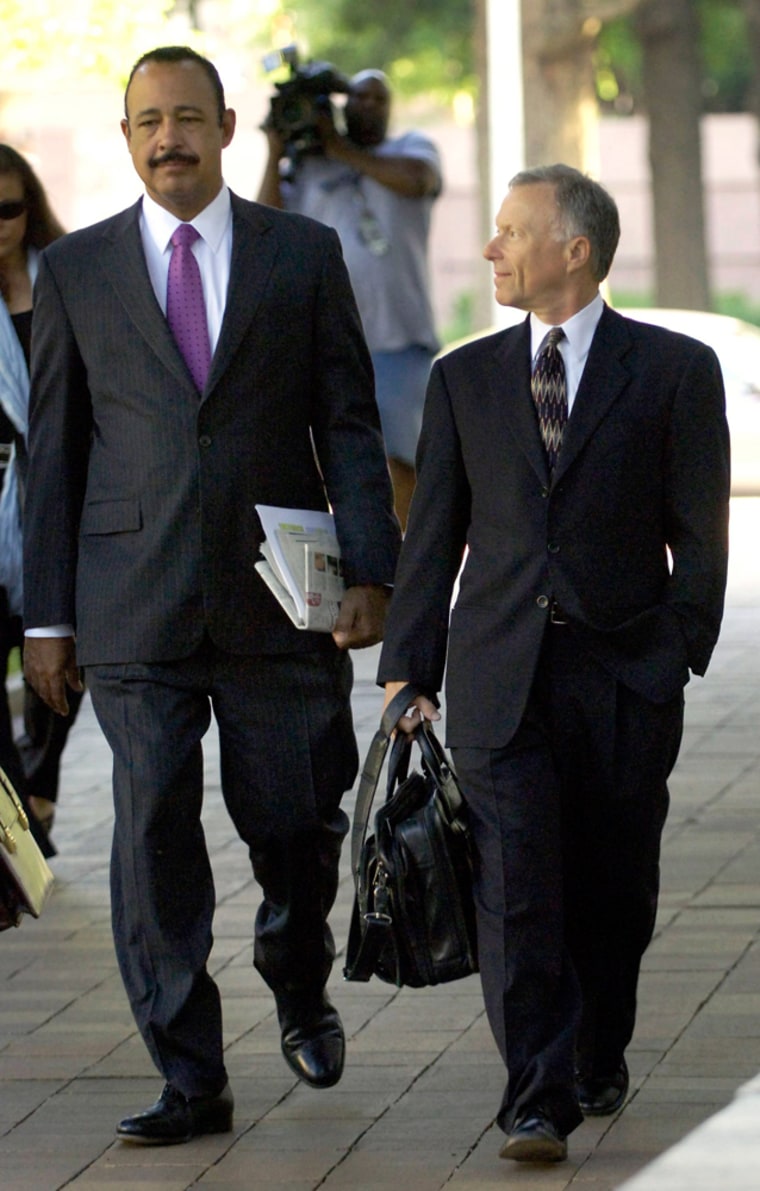In a last minute court filing, attorneys for I Lewis "Scooter" Libby, who was sentenced to 30 months in prison on Tuesday, argue that he should be released on bond pending their appeal of Libby's conviction for perjury and obstruction of an FBI investigation of the leak of CIA agent Valerie Plame's name to reporters.
Libby's lawyers write that their appeal will present substantive issues, "there has been a suggestion that Libby's appeal is merely a dilatory tactic...Libby's pre-trial and trial motions, combined with defense objections preserved in the record, present a number of close questions that are more than sufficient to satisfy the requirements" for appeal.
U.S. District Judge Reggie Walton reluctantly agreed to hold a hearing next Thursday to address the issue of whether to grant bond while the former White House aide awaits his fate in prison. If Walton denies that, Libby would have to surrender to authorities within 45 to 60 days and pay a $250,000.00 fine.
On Tuesday Walton said, "Mr. Libby failed to meet the bar. For whatever reason, he got off course."
Precedent and appeal angles
Libby's attorneys in their last minute filing to attempt to keep Libby out of prison, also cite a recent case in the D.C. Circuit where a judge allowed a defendant convicted of obstruction and sentenced to 18 months in prison to delay reporting to prison until the appeal process had ended.
David Safavian, who was a friend of disgraced lobbyist Jack Abramoff, and who was convicted last year of obstruction and false statements about his relationship with Abramoff was allowed by Judge Paul Friedman to remain free on bond.
Another issue cited by Libby's attorneys as appealable is whether Special Counsel Patrick Fitzgerald's appointment by the Department of Justice to investigate the CIA/Leak was constitutional.
And Libby's attorneys want an appeals court to look at Judge Walton's exclusion of a memory expert witness to testify that Libby's alleged lapses of memory and errors in his statements to the FBI were a result of, "confusion, mistake or faulty memory rather than deliberate deception."
The judge agreed with Fitzgerald who said a memory expert would be, "confusing, misleading and prejudicial," and would unnecessarily delay the proceedings.
His lawyers also plan to appeal the exclusion of most of Libby's proposed classified evidence. The judge did not allow much of the CIA briefers' testimony to be admitted because of Libby's decision not to testify at trial.
And Libby intends to appeal the decision not to allow his lawyers to call NBC's Andrea Mitchell as a witness. They write, "the defense sought to call Ms Mitchell and ask about her knowledge of Ms Wilson's employment prior to Mr. Novak's column." Syndicated columnist Robert Novak was first to publish Valerie Plame's name on July 14, 2003.
Judge Walton said that Libby, who was Vice President Dick Cheney's national security adviser, had an obligation to make sure Plame's CIA status was in the open before talking about it with reporters. "He surely did not make any effort to find out" whether she was covert and "for whatever reason, he chose to reveal this person's name to several reporters," said the judge.
Also at his sentencing Walton said Libby's long career in public service argued for leniency. However, the seriousness of the offense and Libby's "obligation" as a lawyer and government official to be truthful required a sentence that would "promote respect for the law," the judge said.
Fitzgerald will have until Tuesday to respond to Libby's filing.
